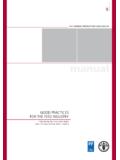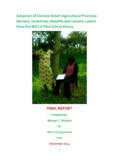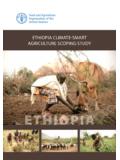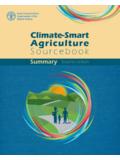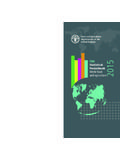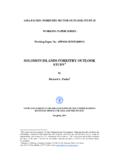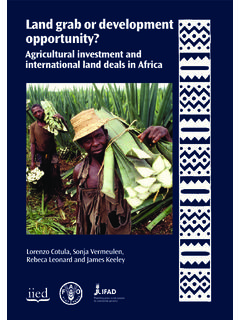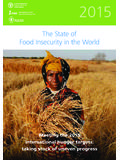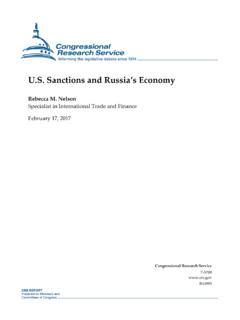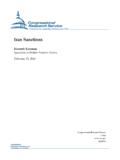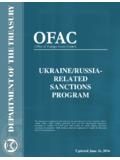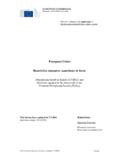Transcription of FAO SANCTIONS PROCEDURES
1 Version 20 November 2014 FAO SANCTIONS PROCEDURES 2 0 1 4 Version 20 November 2014 Table of Contents Section 1: Introduction .. 1 Objectives .. 1 Definitions .. 2 The SANCTIONS Committee .. 4 Mandate .. 4 Composition .. 4 Committee Service .. 4 Secretary .. 4 Advisors to the Committee .. 4 Meetings .. 5 Decision Making .. 5 5 Recusal .. 5 Office of the Inspector General .. 5 Section 2: Temporary Suspension .. 5 Purpose and Effects .. 5 Request for Temporary Suspension .. 6 Submission by OIG .. 6 Committee Decision .. 6 Notification of Temporary Suspension and Right to Contest .. 6 Notification .. 6 Right to Contest Temporary Suspension .. 6 Duration and Extension .. 6 Duration .. 6 Automatic Extension upon SANCTIONS Proceedings .. 6 Request for Extension of Suspension .. 6 Expiration .. 7 Immediate Effect .. 7 Section 3: Proceedings .. 7 Request for a Notice of SANCTIONS Proceedings.
2 7 Submission of Request by OIG .. 7 OIG Redaction of Sensitive Evidence .. 7 OIG Request to Withhold Sensitive Evidence .. 8 Version 20 November 2014 Issuance of the Notice of SANCTIONS Proceedings .. 8 Committee Review and Decision .. 8 Contents of Notice .. 8 Evidence Provided to Third Party .. 8 Denial of Request for Notice of SANCTIONS Proceedings .. 8 Written Statements to the Committee .. 9 Third Party Response .. 9 OIG s Reply .. 9 9 Requests for Clarification .. 9 Submission of Additional Materials .. 9 Section 4: 10 Section 5: Imposition of SANCTIONS .. 10 Committee s Final Determination and Recommendation .. 10 Insufficient Evidence of Sanctionable Action .. 10 Finding of Sanctionable Action and Range of Possible SANCTIONS .. 10 Factors Affecting the Sanction Determination or Recommendation .. 11 Parties Subject to 12 Transmission of Recommendation .. 12 Entry Into Force of Final Decision.
3 12 Decision by the ADG/CS .. 12 Final Nature of the Decision .. 12 Notice of Requirements for Conditional Non-Debarment or Debarment with Conditional Release .. 12 UN Ineligibility List .. 12 Section 6: Disclosure .. 13 Section 7: Rehabilitation .. 13 PROCEDURES and Requirements .. 12 Requirements for Rehabilitation .. 13 Request for Rehabilitation .. 13 Timeline and Committee Review .. 13 Verification and Decision .. 14 Confirmation of Rehabilitation .. 14 Noncompliance with Rehabilitation Requirements .. 14 Section 8: Enforcement of Debarment Decisions by Other Participating UN Agencies .. 14 Version 20 November 2014 Section 9: Eligibility Derogation Measures .. 14 Waiver Request in Case of Special Circumstances .. 14 Waiver .. 14 Effect of 15 Exceptions to Common Actions .. 15 Exceptions .. 15 Effect of Exception .. 15 Section 10: Additional Provisions .. 15 Effective Date.
4 15 Computation and Deadlines .. 15 Extensions of Time .. 16 Language .. 16 Amendments .. 16 Cooperation .. 16 Privileges and Immunities .. 16 Actions Concerning Organization Staff .. 16 Data Protection .. 17 Annex 1: Overview of the Operational Responsibilities .. 18 Annex 2: 19 Version 20 November 2014 1 FAO SANCTIONS PROCEDURES Section 1: Introduction Objectives Fraud and corruption in any form pose a grave threat to the effective implementation of the policies and objectives of the Food and Agriculture Organization of the United Nations ( FAO or the Organization ). In light of FAO s overriding mandate of ensuring humanity s freedom from hunger, it is imperative that no resources are diverted from their ultimate purpose. Fraud and corruption not only divert resources from FAO programs and operations, but also undermine public trust and confidence in the Organization. As a result, the Organization has adopted a zero-tolerance policy ( ) in respect of fraud in all its manifestations, by its own personnel or by any entity financed by FAO or involved in the execution of FAO activities.
5 Such third party entities include vendors or contractors bidding for or contracted in commercial relationships with FAO, or Service Providers, Implementing Partners or other entities receiving financial or other resources from FAO in respect of its programs and operations pursuant to Letters of Agreement, Execution Agreements, or other instruments. In furtherance of its zero tolerance policy, FAO has established the FAO SANCTIONS PROCEDURES ( the PROCEDURES ) with respect to Third Parties. In particular, these PROCEDURES are applicable to alleged instances of specified forms of fraud, corruption or other proscribed activities (as defined herein under Sanctionable Action ) committed by entities engaged in business relationships with the Organization. The objectives of the PROCEDURES are to establish and communicate the steps that will be taken by FAO when handling allegations of Sanctionable Actions, including: the temporary suspension from eligibility to bid in FAO procurement tenders, and/or of ongoing contracts and payments under these contracts, while investigations are underway; the determination of SANCTIONS to be imposed when allegations are supported by the results of investigations; and the reaching of settlements and the rehabilitation of the business relationship with FAO.
6 The PROCEDURES aim to ensure that FAO s zero tolerance policy is applied consistently and with due process to the affected third parties. Version 20 November 2014 2 Definitions For purposes of these PROCEDURES , the following terms shall have the meanings set forth in this section: Authorized Official means the personnel with the responsibility and authority to undertake procurement actions, as well as the financial authority to approve and sign Contractual Instruments on behalf of the Organization under the provisions of Manual Section 502 or 507 of the Administrative Manual of the Organization, or personnel delegated to sign Execution Agreements or other instruments. Days means working days, unless stated otherwise. Eligible Vendor means any legal entity, or their agents or representatives, which may supply goods, works or services to the Organization under the provisions of Manual Section 502 or 507, or an actual or prospective Implementing Partner or other entity, and which has not been included in the Ineligibility List, or if having been included, being duly rehabilitated or exempted.
7 Implementing Partner is an entity which undertakes activities in support of a partnership established under a formal agreement with FAO including Execution Agreements. Ineligibility List Administrator means the person responsible for maintaining and updating the Ineligibility List hosted by the United Nations Global Market (UNGM). Ineligibility List means the central list administered by the Ineligibility List Administrator, hosted and maintained confidentially by UNGM and available to Participating UN Agencies, which specifies the name, location, grounds for ineligibility as well as effective and terminal date for each ineligible vendor status. Ineligible Vendor means any legal entity, or their agents or representatives, which, whether by the Organization or any other Participating UN Agencies, has been temporarily or permanently debarred to participate in current or prospective procurement actions due to its involvement in a Sanctionable Action, and included in the Ineligibility List.
8 Organization means the Food and Agriculture Organization of the United Nations (FAO). Participating UN Agency means the United Nations, any of its subsidiary entities, Funds, Programmes or Specialized Agencies, which are implementing a vendor SANCTIONS system through the Ineligibility List. Preponderance of evidence means that upon consideration of all the relevant evidence, it is more likely than not that the Third Party engaged in a Sanctionable Action. Version 20 November 2014 3 Rehabilitation means the process through which a Sanctioned Party may restore its business relationship with the Organization. Sanctionable Action means: (a) With respect to procurement, a corrupt, fraudulent, collusive or coercive practice, occurring at any time during the procurement process (including contract execution or anytime thereafter), and defined as follows: (i) corrupt practice or corruption means the offering, giving, receiving or soliciting, directly or indirectly, of anything of value whether tangible or intangible to improperly influence the actions of another party; (ii) fraudulent practice or fraud means any act or omission, including misrepresentation that knowingly or recklessly misleads, or attempts to mislead, a party to obtain a financial and/or other benefit and/or to avoid an obligation; (iii) collusive practice is an arrangement between two or more parties designed to achieve an improper purpose, including influencing improperly the actions of another party.
9 (iv) coercive practice is impairing or harming, or threatening to impair or harm, directly or indirectly, any party or the property of the party to influence improperly the actions of a party; or (b) Any unethical practice contrary to the conflict of interest, gifts and hospitality or post-employment FAO policy ( ), as well as any provisions or other published requirements of doing business with the Organization, including the UN Supplier Code of Conduct ( ); or (c) Obstruction, which means acts or omissions by a Third Party that may prevent or hinder the work of Investigation Unit of the OIG. Sanctioned Party means any Third Party on which a sanction has been imposed by the Assistant Director-General of the Corporate Services, Human Resources and Finance Department ( ADG/CS ) upon recommendation of the SANCTIONS Committee. Third Party means any entity considered a Vendor or Service Provider under Manual Section 502 or 507, respectively, including its Affiliates, Successors or Assigns, alleged to have engaged in a Sanctionable Action.
10 For the purposes of this policy, Third Party also includes any entity, including those designated as Implementing Partners, entering into Execution Agreements with the Organization. A Third Party may also be considered responsible for any Sanctionable Action, or Version 20 November 2014 4 attempted Sanctionable Action, committed by another party, including employees, agents or representatives, acting in the capacity of representing the Third Party, regardless of whether the act has been specifically authorized. The SANCTIONS Committee Mandate. The SANCTIONS Committee ( the Committee ) shall determine whether a Third Party has engaged in any Sanctionable Action and, if so, recommend appropriate sanction(s) or other corrective and rehabilitative measure(s) to the Assistant Director-General of the Corporate Services, Human Resources and Finance Department ( ADG/CS ). In order to reach its determinations and formulate its recommendations, members shall analyse all evidence and asses its relative value.

